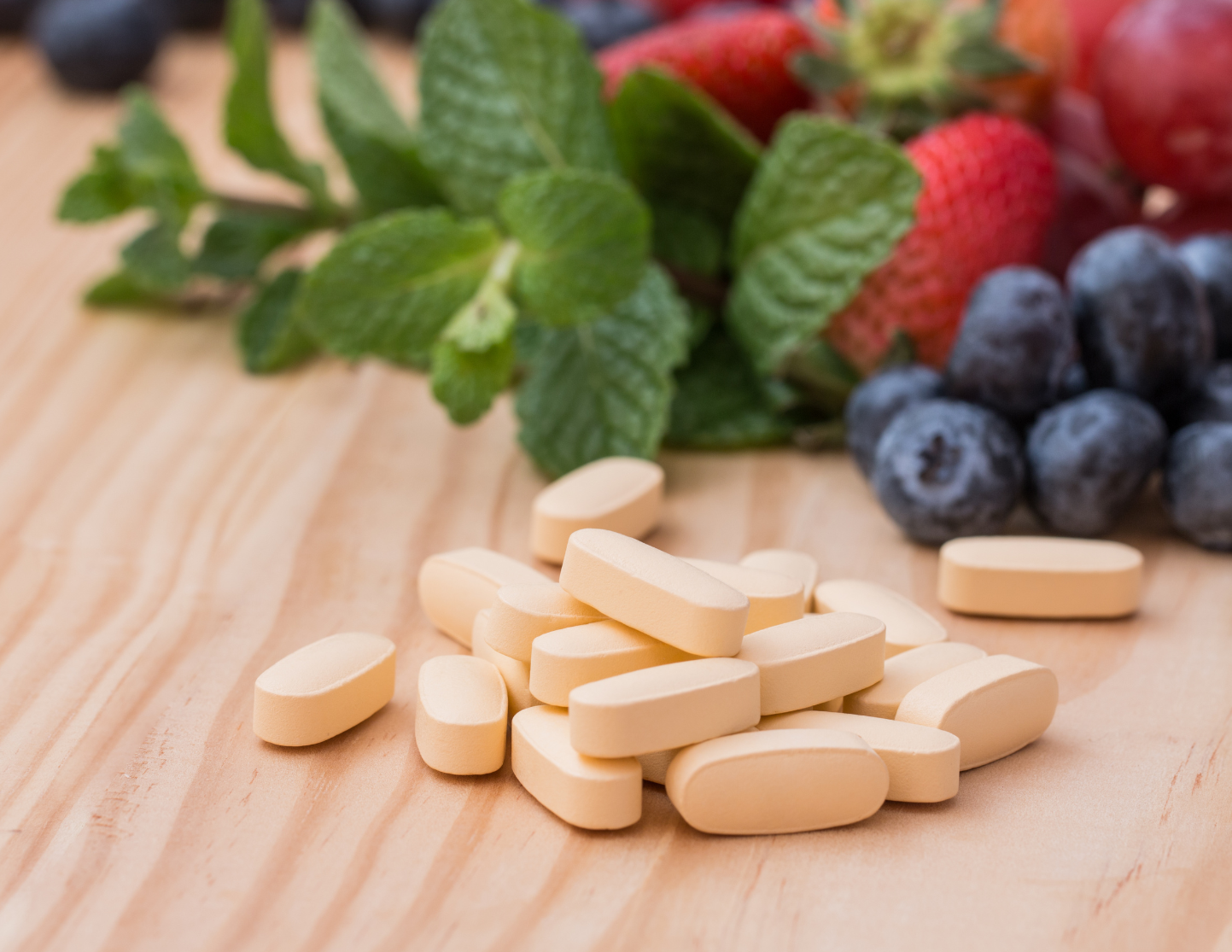We get it. It’s hard to know exactly where to start when you’re stepping into the world of natural medicines, supplements, and establishing a daily wellness supplement routine. To make matters more complicated, there are thousands of social media accounts, books, and experts to choose from, and they all promise that their way is the best. Although some of these resources may hold merit, taking it all in and knowing where to start for your specific needs can get overwhelming.
At Wholly Holistic, we have gathered and analyzed hundreds of resources. As a result, we’ve put together the top three things anyone should do to get started in a good daily wellness and supplement routine. Once you have these three goals met, then you can think about adding in your personal needs, such as cardiovascular health, hormone balancing, and more.
Step 1: Take a Good Multivitamin Every Day as Part of Your Daily Wellness Supplement Routine

Our bodies are designed to thrive on a daily balance of basic vitamins and minerals. Many of which, fortunately, we can get from food. For instance, eating a diet rich in multicolored vegetables, fruits, whole grains, legumes (beans), and healthy fats ensures that you’re meeting the needs of your organs.
However, eating everything you’re supposed to eat every day can be hard to do, especially if you’re on a budget or you don’t have easy access to nutritious food stores. This is precisely where a good multivitamin and mineral supplement comes in. Multivitamins are designed to help fill the gaps in your daily nutrition while also supporting your immune system, bones, skin, and other organs.
What makes a good multivitamin for your daily wellness routine?
Look for a multivitamin that fits your specific body. For instance, there are multivitamins for prenatal, pregnancy and post-pregnancy, children, people over 55, and so on. Each blend is specifically crafted to support what your body may be lacking during these times in your life.
Additionally, look for a multivitamin that does not have a lot of filler ingredients, since your body may not absorb that much. In fact, this is one of those instances where you get what you pay for!
Furthermore, as an added bonus to your run-of-the-mill multivitamin, we at Wholly Holistic carry multivitamins that include whole foods (like berries) in the tablets. By taking these, you ensure you’re boosting your nutrition and adding the foods that you may not enjoy eating or that you miss from time to time.
What side effects are there for multivitamins?
Most people can take multivitamins without worry of side effects. However, if you have a specific condition, it is always good to double-check how the vitamins you are considering may interact with your specific health conditions. For instance, Vitamin K should be avoided for people who are on blood thinners. Additionally, nausea and upset stomach are common side effects of vitamins, but these can be mitigated by taking them with a meal. In fact, some vitamins, like vitamin D, are best absorbed with foods that contain fat.
Step 2: Take Care of Your Gut
New research and discoveries are being made every day about how much your digestive system plays a role in both your physical and mental health. In fact, the gut-brain connection is a flow of nerves that send signals between your brain and your digestive system. Moreover, these nerves also work closely with your endocrine system, which produces the hormones that communicate things like hunger, fullness, and stress. Furthermore, all of these systems work together with your immune system to respond to injury or disease.
The gut-brain communication is vital in keeping our instincts sharp and our overall health in check. As a result, the connection is so important that many call the gut our “second brain.”

Microbiome and your health.
Each of us has our own unique combination of microscopic bacteria, fungi, parasites, and viruses that make up our intestinal microbiome. In fact, no two of us are alike! Moreover, these organisms work in concert to make up your whole world of health. Everything from breaking down your food to training your immune system to recognize bad pathogens. As a result, feeding your microbiome a variety of foods helps it to thrive and ensures that the rest of your mind and body function properly.

What foods should I eat that are good for my gut?
Eating a variety of whole grains, fruits, vegetables, and legumes (beans and nuts) is the best way to feed your microbiome. In fact, whole foods like these digest slowly and have tons of good nutritious benefits. Because they stay in your gut longer, your intestines have more time to latch onto the nutrients and absorb them.
Moreover, aiming for at least 20-30 different fruits and vegetables per week is key. Additionally, spices and herbs count in this number, too. For example, adding turmeric to a smoothie, fresh basil to a tomato sandwich, and fruit in your water bulks up what you’re ingesting and feeds your microbiome what it loves. As for whole grains, think beyond bread to delicious steel-cut oats, barley, farro, rice, and quinoa. The easiest way to get started is to make the food you normally make, switching out different grains, and adding in a variety of new vegetables and fruit.
Furthermore, the digestive system as a whole tends to love bitter things and thrives on fermented foods like sauerkraut, kimchi, and pickled vegetables. In addition, adding in a daily dose of apple cider vinegar and root herbs like burdock and ginger helps keep the microbiome thriving.
What happens when my gut is out of whack?
When your microbiome doesn’t have enough variety to keep it thriving, it will die off, which means your whole body can get out of whack, making you more prone to stress and disease. For instance, think about how you feel after a big holiday meal full of rich foods and drinks that you don’t normally consume every day. We can all relate to that sluggish feeling. Although you may only eat that way a handful of times a year, your daily diet may still contain food and drink that harm your good gut bacteria, such as ultra-processed foods.
When your microbiome is not thriving, you might experience:
- Constipation
- Sluggishness
- Difficulty focusing
- Depression
- Diarrhea
- Anxiety
- Bloating and inflammation
- Acid reflux
- Hard to lose weight (low metabolism)
- Stress
Where do I start with daily gut health supplements?
Even with our best efforts with food, we know that it’s hard to get our daily digestive wellness needs met. Therefore, this is where digestive supplements, fiber, pro and prebiotics, and digestive enzymes come in. Much like the purpose of multivitamins, digestive supplements help to fill in the gaps of what your gut might be missing and, in turn, help you feel better overall.
Detoxing and cleansing
To start, you might consider a gentle detox and/or cleanse to rid your body of what is slowing it down and to prepare your body to receive nutrition. In addition, at Wholly Holistic, we have several kinds of plant and herb-based detoxes and cleanses available to help get you started.
Pre and Probiotics
Probiotics are live bacteria in certain foods, like fermented foods such as yogurt and sauerkraut, or supplements. In addition, prebiotics serve as the “food” that probiotics eat. Prebiotics can be found in fruits, vegetables, and whole grains and can also be taken in supplements. Together, prebiotics and probiotics work to keep your microbiome healthy.
Similar to multivitamins, pre and probiotics are often crafted based on groups of body types, such as by age and sex. For example, consider adding at least 10 billion to start and potentially working up to at least 60 billion for daily gut wellness. At Wholly Holistic, we have a wide variety of both refrigerated and freeze-dried prebiotic and probiotic blends to choose from.
Adding Fiber
One way to keep your bowels moving and healthy is to add a daily fiber routine. Tray a fiber such as psyllium husks, which come from a shrub-like herb called Plantago ovata, or plantain. Interestingly, many of us have a version of this plant growing as a weed in our own backyards. Psyllium husks act as a gentle, bulk-forming laxative that relieves constipation, firms up diarrhea, and may even help manage blood sugar levels while boosting heart health.
Laxatives
When all else fails, laxatives can help keep your bowels and digestive system moving. At Wholly Holistic, we carry several brands of natural, plant and herb-based laxatives that can help relieve occasional constipation.

Step 3: Keep Yourself Hydrated Every Day
Like our earth, your body is made mostly of water. Therefore, keeping your body hydrated is one of the most important steps you can take to keep your entire body healthy every day. Water not only carries nutrients to your cells, but also flushes out your waste, lubricates your joints, regulates your temperature, protects your organs, stabilizes your blood sugar, and more.
What happens to my body when I don’t get enough water?
When your body doesn’t have enough water, it tries to pull water from your organs, like your skin and brain, to try and function. Consequently, this creates a whole host of issues (below). In fact, because you naturally fast when you sleep, your body is often already dehydrated when you wake up.
Dehydration creates a number of issues in your daily lives that you may not even realize:
- Headaches
- Mood swings
- Confusion
- Dizziness, fainting
- Constipation
- High and low blood pressure
- Feeling cold or hot all of the time
- Hot flashes made worse
- Hormone fluctuations
- Tiredness, fatigue
- Dry skin and scalp
- Inflammation –
Many people think that inflammation happens when you have too much water, which is sometimes true, but it can actually be made worse by being dehydrated. In fact, water helps to flush away excess fluids, and many over-the-counter and prescription anti-inflammatory remedies only work when your body is properly hydrated. Specifically, these remedies are designed to pull the water from your body and flush out the excess water and toxins through your gut. However, if you’re dehydrated, the anti-inflammatories don’t have enough water in your body to pull from and may leave you more dehydrated. Which in turn may add to the issue you’re trying to fix.
How much water should I drink every day?
This depends on where your body is at in life—for example, age, exercise level, pregnancy and breastfeeding, weight, sex, etc. Additionally, the answer also depends on where you live and what you do for a living. For instance, people in hot climates and those who work outside or in more physically active jobs need more hydration. Moreover, there are many other factors, such as people with diarrhea-related IBS, who may need to drink more water, whereas people who are later in life may need to drink less.
A good, general rule of thumb is about half of your body weight in ounces of water every day. Also, start with 1 glass right out of bed in the morning, before coffee, tea, and breakfast. For example, if you weigh 150 pounds, you would aim for 75 ounces of water (or about 9, eight-ounce cups). By relieving your body’s overnight fast with hydration you will feel perky and get your digestive system moving, perhaps even more so than your morning coffee.
Keep in mind, not all liquids are helpful for your daily hydration. For instance, drinking a caffeinated beverage can reduce your kidneys’ ability to absorb water, leading you to lose more water through your kidneys. Similarly, alcohol is dehydrating, too.
How to hydrate creatively:
We know it can be hard to drink water all day long, every single day. So, here are a few ways you can drink smarter, not harder.
- Natural beverages, like coconut water, are beneficial because they contain magnesium, potassium, and calcium. As a result, these options help you retain the water that you’re drinking. Although you may not want to consume a lot of this type of fluid every day, they can help break up the monotony of plain water.
- Smoothies with fresh and frozen fruits and vegetables are an excellent way to not only get hydrated but also meet the other two goals in this blog: daily wellness (multivitamins) and gut health.
- Bulk up on high water content fruits and veggies like watermelon, celery, cucumbers, etc.
At Wholly Holistic, we carry a wide variety of hydration helpers such as spring water, coconut water, electrolyte powders, kombucha (which also contains probiotics) and so on.
What Next for Your Daily Wellness Routine?
After you meet your daily goal of multivitamins and minerals, digestive health, and hydration, the sky’s the limit! You can then add in what your individual body may need, such as extra immune support, hormone balancing, cardiovascular support, thyroid support, and more. As you continue to build your daily wellness supplement routine, these additions can help further enhance your overall health.
At Wholly Holistic, we can work with you to meet your health goals. Therefore, stop in, call, or message us today to ask all your questions and schedule a health coaching appointment with one of our registered naturopath practitioners.
See you at the shop!
Sources:
New York Times, January 2024: How Much Water Do I Need to Drink?
Center for Disease Control, January 2024: About Water and Healthier Drinks
Healthline, May 2024: Prebiotics vs. Probiotics for Gut Health
MedExpress, August 2024: 7 ways to stay hydrated (that don’t involve drinking water)
The Guardian, March 2023: Chew slowly, keep moving and eat 30 plants a week: 12 rules for gut health.
Cleveland Clinic, August 2023: Gut Microbiome
Cleveland Clinic, September 2023: The Gut-Brain Connection
WebMD, November 2023: Health Benefits of Multivitamins
National Library of Medicine, February 2012: Magnesium Basics

